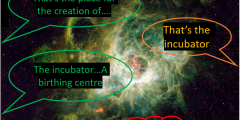Social, cultural and ethical aspects of synthetic biology: A scientist’s perspective
January 12, 2018
When you go to the website of the Dymond Research Group at the University of Brighton, you see article titles like this “Lipid Spontaneous Curvatures Estimated from Temperature-Dependent Changes in Inverse Hexagonal Phase Lattice Parameters: Effects of Metal Cations”. That probably means something to experts in the field. It doesn’t mean a lot to me. …
Genome editing: Invisible mending
December 1, 2017
Last week I had a few days in Oxford to visit old haunts, such as the Ashmolean, the Museum of Natural History and the Pitt Rivers Museum. I also went to a little exhibition in the basement of the Museum of the History of Science. The exhibition by Anna Dumitriu was entitled BioArt and Bacteria. …
Genome editing, metaphors and language choices
November 17, 2017
Genetic Alliance and the Progress Educational Trust recently published a report entitled ‘’Basic understanding of genome editing”, based on research supported by the Wellcome Trust. As I have worked on metaphors relating to genetic, genomics and genome editing for more than twenty years, I was particularly interested in this report. Unlike many other publications, including …
Science and metaphor: Some historical perspectives
October 13, 2017
Over the last thirty years or so I have written about metaphor and its importance to language, thought and social interaction. In the last fifteen years, I have focused in on the relation between metaphor and science, especially science communication. However, only recently has it dawned on me how little I actually understand about metaphor …
Base editing, biological complexity and the limits of metaphorical explanation
October 2, 2017
Gene editing has been in the news since around 2013. Here I want to focus on one of the most recent advances which made me question my own understanding of gene editing. In 2015 a team of scientists led by Junjiu Huang at Sun Yet-Sen University in Guangzhou, China, used gene editing techniques, in this …
Metaphors for many goals: Discussing research in interactional settings
July 28, 2017
This is a guest post by Rony Armon, a Research Assistant at the School of Education, Communication and Society King’s College London, specialising in Communication and Media, Qualitative Social Research, and History of Science. *** In a recent post Brigitte Nerlich reviewed some studies that seemed to suggest that even though metaphors are rampant in scientific discourse …
Do metaphors really matter?
June 16, 2017
I, like many others, from Leibniz to Lakoff, think that metaphors are important for human thinking and acting. They make us see the world in different ways – for good or evil. So, one should keep an eye on them. Recently I have read two articles which seem to imply that metaphors matter less than …
Building bridges in mind, language and society
January 6, 2017
On 2 January Mo Costandi tweeted: “’Be the neurotransmitter in your world. Diffuse ideas & human connections.’ Talking, the new world changing concept”. The quote within the tweet was taken from an article by David Rowan, Editor of Wired, in response to the 2017 question posed by Edge: What scientific term or concept ought to …
Musings on language and life, with special reference to ‘programming’
April 1, 2016
This morning I opened the newspaper and read an article about a new language that lets researchers design novel biological circuits. I mumbled something about this over coffee and my husband said, oh but wasn’t that old hat, we all knew that DNA was a language, code etc. So what was new? I looked again …
Synthetic biology, metaphors and ethics: An emerging topic of international interest
February 20, 2016
As some of you know, I have been interested in metaphors for a long time and more recently have become intrigued by metaphors used when talking about synthetic biology, gene drives, gene editing and so on. This has led to a meeting in Cambridge (Downing College) between Steven Burgess, who edits the PLOS Synbio community …
Subscribe by email
About this blog
This blog promotes discussion of topics related to the research programme 'Making Science Public: Challenges and Opportunities'. Our purpose is not to 'make science public'. Instead, we want to study the opportunities that have emerged for science to be more openly practiced and debated, but also the challenges posed by making science public or by promoting the making public of science as a solution to a variety of problems in society and in politics.
This blog will report on these and other issues related to the Leverhulme funded research programme: Making Science Public: Challenges and Opportunities
Useful links
Recent Posts
- Climate change and climate discourse: A dual disintegration
- Erving Goffman: Memories, method and metaphors
- Participation at the core: AI, ELSI and community engagement
- Understanding computational hermeneutics: Making meaning between the past and the present
- AI winter and AI bubble: Historical and metaphorical reflections
 MSP bookmarks
MSP bookmarks
- Twitter May 8, 2017
- Social innovations in Europe #RRI November 3, 2015
- Harvey Graff, the undisciplinarian September 20, 2015
- Replacing Pesticides With Genetics August 31, 2015
- Addressing hazardous chemicals in the circular economy August 25, 2015
Categories
- antibiotics
- anticipatory governance
- artifical intelligence
- big data
- biotechnology
- citizen science
- Climate Change
- Climate Politics
- co-production
- coronavirus
- Creationism
- Definition of Science
- designer babies
- disease
- disease
- engineering
- epigenetics
- Food Security
- Food sovereignty
- gene drive
- genomics
- GM Food
- GMOs
- history of science
- Hype
- images and visualisations
- imaginaries
- Immigration
- Impact
- infectious diseases
- innovation
- interdisciplinarity
- Knowledge Society
- Language
- Markets
- Metaphors
- microbiome
- neoliberalism
- Neuroscience
- open access
- Personal Reflection
- Politics
- Public education
- public engagement with science
- public needs
- public participation
- public policy
- public service
- publics
- regulatory science
- Religion
- Republican Party
- research impact
- responsible innovation
- responsive research
- Richard Dawkins
- risk
- Scepticism
- Science
- Science and Government
- science and politics
- Science and Songs
- science communication
- Science Communication
- Science Fiction
- Science Policy
- Social science
- sociology
- space
- space exploration
- synthetic biology
- transparency
- Trust
- Uncategorized
- Uncertainty
- visualisation
- wonder









